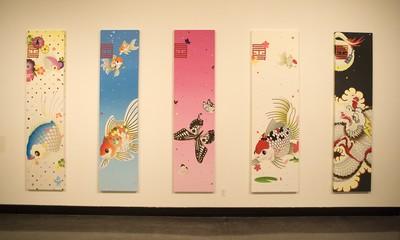Coloring the Canvas

Curator Libby Lumpkin didn’t intend to develop a theme when she chose art by two Japanese artists to run at the same time at the Las Vegas Art Museum.
It just looks that way.
In the main gallery is "Kaz Oshiro: Paintings and Works on Paper, 1999-2006," and in the museum’s Polis Carver Gallery, "702 Series: Sush Machida Gaikotsu," both on view through July 8.
Despite being born in Okinawa in 1967, Oshiro’s work is as far from the influence of traditional Japanese art as one can get. At first glance, his paintings don’t look like paintings at all. Oshiro’s subject matter includes stacks of guitar amplifiers, a white washer and dryer, kitchen cabinets, a microwave, trash cans, a small refrigerator, a car bumper and tailgates from old Toyota pickups.
The three-dimensional paintings are shaped to look just like the objects they are depicting, but with some nice touches, such as the spilled liquid detergent that runs down the side of the washing machine and the two pieces of what appear to be duct tape on a cabinet.
Everything is made with canvas, down to the knobs and handle on the amplifiers.
"We realize this art is challenging," Lumpkin says. "It can be strange on a first encounter, but that’s when you know it’s doing its job. You’re forced to think about the art work. It’s a philosophical discourse about the culture and it challenges our received perceptions."
Oshiro lived in Japan until 1986, when he moved to Los Angeles. He earned a master of fine arts degree at California State University, Los Angeles in 2002.
Oshiro has been in group exhibits in Miami and New York. His work also has been in the Orange County Museum of Art’s 2004 California Biennial Exhibition and the UCLA Hammer Museum exhibition "Thing: New Sculpture from Los Angeles" in 2005.
The exhibit is the first substantial museum survey of Oshiro’s work, Lumpkin says.
Meanwhile, Gaikotsu’s work has more of a Japanese feel to it.
Born and raised in Maebashi City, outside Tokyo, Gaikotsu graduated in 2002 with a master of fine art degree from the University of Nevada, Las Vegas and in 1999 earned a bachelor’s degree from Utah State University in Logan.
His work, which has been exhibited in Los Angeles, New York and Tokyo, "combines American pop styles with the Japanese graphic art style," Lumpkin says. Works in the exhibit feature cats, mice, dogs, an elephant and fish — "Gaikotsu" means fisherman in Japanese, and the painter also competes in fishing tournaments in the west.
Whereas Oshiro’s paintings seldom use bright colors, Gaikotsu’s are the opposite. His largest painting, created this year just for the exhibit, is the 96-by-280-inch "Underground Cafe Pink" and features swimming fish and flowers.
Painted in vertical sections, the work is "so large he didn’t see it in one piece until it was brought to the museum," Lumpkin says.
Gaikotsu’s exhibit was organized by Los Angeles Times art critic David Pagel, a champion of Oshiro’s and Gaikotsu’s work.